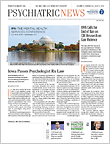The contrast between the brilliant morning light pouring through my kitchen window and one of the front-page headlines in the New York Times could not have been starker: “Bedlam Erupts in House Sit-In by Democrats” (June 23, 2016). As I pored over the paper, soaking in the details of the fracas over the lack of action on the latest gun control bill, I could barely believe it. There it was: the Republican leadership working to restore order by cutting off the microphones and the feed to C-SPAN; Democrats chanting, “No bill. No break.” I could not help thinking: this is a watershed moment for psychiatry!
Why? Because guns kill people. Of course, that is an obvious statement. But guns kill people not only in the way that dominates public discourse and debates over policies on gun control: mass murder, homicide.
Guns kill people most often by suicide.
That is not to say that mass murder, so sadly common in this great country, or homicide, also dismally common, are unimportant. Our society most definitely needs to address these critical problems. But the sad truth is that most of the time, guns are used by people to kill themselves.
Do the math: in 2013, the rate of homicide by firearms in the United States was 3.5 per 100,000 people. In contrast, the suicide rate by firearms was 6.7 per 100,000 people. According to the Centers for Disease Control and Prevention (CDC), over 33,000 persons died from firearm injuries in 2013; suicides were close to double the number of homicides at 63.0 percent and 33.3 percent, respectively. That, for most of U.S. citizens, is a shocking fact.
To address these stunning statistics, we need to be active and we need to be practical. As psychiatrists, we have an active role to play in making these numbers a critical part of the conversation on gun safety and advocating for change.
One key first step in advocating for gun safety is to make sure that firearms are kept safe and secure, away from family or friends who may be suicidal. Interestingly, the New Hampshire Gun Safety Coalition has put together 11 “commandments” for gun safety and specifically recommends “temporary off-site storage if a family member may be suicidal.” Although the availability of these guidelines is very helpful, adoption of even these modest steps has been difficult to secure. Even laws about gun safety, never mind gun control, have gone unpassed.
Worse, in Florida, physicians are forbidden to have general conversations counseling patients about gun ownership. This leaves a gaping hole in the assessment of availability of means to attempt suicide and for accidental deaths. According to the American Academy of Pediatrics, 10 additional states have introduced legislation that restricts doctors’ ability to counsel patients about gun safety. Fortunately for our patients, there are no laws at either the federal or state level that prohibit doctors’ questioning of patients about whether they own guns, if it is relevant to the patient’s health or the health of others.
Now, at least there is a big fuss being made about the lack of progress on gun laws on Capitol Hill. For our patients, and for public health and safety, we need some action. And while I don’t know if there will be action, that there is outrage on the Hill is huge progress. ■

